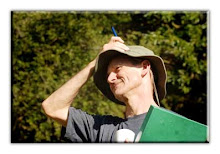I have been participating in an interesting discussion on Tony Karrer's blog on Brain 2.0. The subject under debate was "the importance of learning a bunch of facts that someone can look up at a later time", especially now that modern technology allows us to look up facts so easily, and the body of knowledge keeps changing so fast. Apparently Tony feels that the need to learn facts is reducing while his wife Margaret writes: memorization is a skill that needs to be developed and sometimes information needed is not readily accessed. This is a theme that has been discussed on the Internet quite a lot recently. Tony links to this video lecture by Michael Wesch which is about moving away from being knowledgeable to being knowledge-able. i.e. what matters is not what you know but your ability to access all the knowledge that is out there.
It is an important but confusing subject and it is quite difficult to pin down exactly what the issue is.
1) Tony's and Margaret's views as written are consistent with each other. Tony accepts the need to memorise some facts, and Margaret accepts that there is need to be able use modern technology to obtain facts. It is a matter of degree.
2) There are couple of red herrings lying in wait:
a) Tony is concerned about learning unnecessary facts such as the names of state capitals. No one in their right mind is going to demand that students learn unnecessary facts, except perhaps as some bizarre exercise in memory training. There is long-standing debate as to what facts are necessary (e.g. how much history should children know?) but that has little to do with new technology and is largely a matter of values.
b) There is also a long-standing objection to courses and education which are "just memorising a lot of facts". Most educators accept that education which simply requires rote learning of facts without moving any higher up the Bloom cognitive scale is very limited and unlikely to be of much value. Learning a lot of facts does not entail learning them by rote. You can acquire and retain facts much better if you learn them as part of activities which are cognitively deeper. Again I see no special link to new technology here. Criticism of rote learning has been around for decades if not centuries.
3) The real issue is summarised by Tony's comment:
What's becoming clear to me is that we can be spending time teaching students how to become "filled with facts" and they can become expert at that process in order to pass the test or we can reduce that in order to help them focus on other things.
The idea presumably is that nowadays we don't need to retain so much knowledge in our brain as facts are so quickly and easily accessed. What we need is the broad concepts and the skills to access and interpret all those facts as the need arises. And this is precisely where I am not convinced by Tony (or by Michael Wesch). I think it is false dichotomy. Tony uses the example of a history teacher who tested him on the size of the population of England in 1800. He rightly dismisses that as a test question because it involves only low level cognitive skills. But anyone who wants to be an expert on English history of that period would benefit greatly from knowing that fact (without having to look it up). For example, if confronted with documentation about the size of the population of London or the percentage of working men fighting in the Napoleonic wars they would immediately be better placed to assess the plausibility and of the documentation and interpret its significance. They would be far more likely to retain any new information they learned about the English population because they would be in a position to link new data to their existing knowledge. As John Medina says in brain rules – we remember things better if we elaborate on them – and there is much more scope for elaboration if you already know a lot.
The point is that knowing facts is one of the best tools for accessing and using other facts. Being knowledgeable is key to being knowledge-able. So the model that says knowledgable and knowledge-able are mutually exclusive is far too simple. To use the new technology effectively we should know even more and the technology will allow us to gain that extra knowledge more easily.

